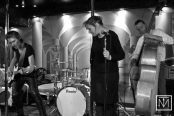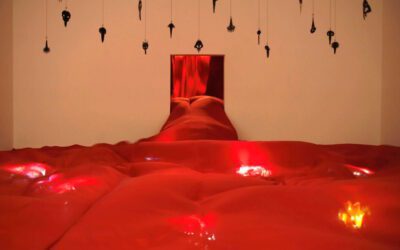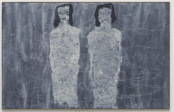Calling upon Kwes to produce, Big Dada apply a sonic approach to Speech Debelle's return album that, even this early in the producer's career, tends towards formulaic.
It's there right at the outset: the nagging feeling that Debelle's rhymes on 'Studio Backpack' (in themselves sounding like something that should have been on Wiley's 100% Publishing) are simply a vocal track that was secondary in importance to the often-pompous tonal wizardry that Kwes builds.
a vocal track that was secondary in importance to the often-pompous tonal wizardry
'Live for the Message' draws once again on the early synth and sampling days of The The and Soft Cell that seem to form much of Kwes's sonic inspirations. Like on his production of DELS's Gob, (particularly 'Droogs') there is, in the use of a restrained horn section sample, much to remind the listener of Dave Ball's similar approach to creating a backdrop for a well-enunciated voice.
And whatever we think of Speech Debelle's deep immersion in the argot of London yoofspeak, and however different it is socially from the plummy tones of Marc Almond in full Erotic Cabaret mode, she certainly enunciates.
Given that her own story – a much-lauded early career, leading to a period of overconfidence, followed by a return, defeated(?), to the label that launched her – so resembles that of her labelmate Wiley, it's a pity that she has emulated so closely the least compelling aspects of his approach.
the attention given to nonsensical trivialities, the supreme confidence that everything uttered has the authority of experience
The swagger, the staccato spitting flow, the attention given to nonsensical trivialities, the supreme confidence that everything uttered has the authority of experience. Speech Therapy didn't win that ill-fated Mercury prize because of any of that, but because in her unguarded moments Debelle could open out aspects of her life that were evocative, sensitive and often tragic.
the real drama is in its openness and honesty
'Elephant in the Living Room' brings some of that insight back: 'If I stay here any longer, I'll be a liar', 'I guess I'm in love with my own selfishness, and I'm sitting here acting like it's selflessness'. Set against a pretty standard strings and beats soundbed, there is drama laded onto the sonics of the track, but in fact the real drama is in its openness and honesty – a flawed character admitting to her own complicity in a doomed relationship.
That is the stuff that new, great hip-hop is made of. Not, gawd help us all, 'She got the future of the world on her iPod/Her plug-ins are good lovin' ('Studio Back Pack')
It's better handled than the whiney bluster of 'X Marks the Spot', which is only rescued from Kate Nash-style we-don't-love-each-other-but-we're-not-breaking-up ignominy by a slick little 'clear as clingfilm' simile and a bright filtered-piano and guitar melody lightening up a hefty bass and beats track. 'Angel Wings' though, is a standard 'h8trs gunna h8, coz I followed my dreams and worked harder than anyone out there to get what I got' tale of hip-hop megalomania.
And whilst Debelle's backstory of homelessness and estrangement is more authentic than many, the trope has been stale for decades now. Worse, the track is backed by a flaccid rejig of the tonal backdrop of 'DLR' by DELS. This recurring overlap between the production sonics of DELS's Gob, and the tired self-obsessed swagga of Wiley's 100% Publishing is tiresome.
When Rodney Smith's unmistakable voice appears in a cameo role on 'Blaze Up a Fire', bringing a politically-minded barrage to the song, the sense of having heard this album before is unavoidable. True, the subject matter is updated to include fleeting references to the Dalston riots, although Debelle's own lines are painfully missing anything so current (media manipulation, Fallujah, the Arab Spring are as topical as she gets).
she has a cracked lusciousness to her voice that strongly recalls Martina Topley-Bird
Ironically, it's in the songs where she focuses on the flimsy but eternal questions of love, sex and attraction that Debelle is often most interesting. 'Im With It' has her bringing out a soulful dance groove and a believable sensuality that can't help but convince. On the rare moments that she actually extends a line to the point where she sings, as opposed to emcees, she has a cracked lusciousness to her voice that strongly recalls Martina Topley-Bird's most meltingly sexy moments on Tricky's Maxinquaye. It really is a shame she doesn't do so more often.
'The Problem' should really be the final track – it has the build and dynamic that would close things perfectly. A statement of intent that shows exactly why she cannot be ignored, 'I am not a child, I'm a fucking grown woman with a big grown life/where they're pissin' on kids, and beating up the wives….' 'So you better be afraid, of what we got to say'. And on this occasion, it's almost dangerous and intense enough to convince.
a semi-bonkers litany of the post apolcalyptic Eden
Alas, the album doesn't end there, and the social comment gets a little overextended in 'Collapse', which brings us on a semi-bonkers litany of the post apolcalyptic Eden that might result from the inevitable social and geographical collapse that follows greedy corporations and banks 'attacking the earth like fellatio'. It's mad, a little funny, almost prescient, but ultimately more laughable than laudable.
But all-in, taken as a twelve-song album, there is far more to applaud on this album than to criticise. Whatever the real circumstances of Debelle's return to Big Dada (or if she ever actually left) are obfuscated by rumour and counter-statement. It doesn't really have any relevance – her disappointment at the realities of the music business in the torrent age (even for prizewinning artists) are behind her now.
And to her credit, there is no obvious bitterness or even loss of confidence in her work since the Curse of the Mercury Prize afflicted her. 'Sun Dog', closing the album, does so with machine-gun delivery and the mega-swagger that typifies most hip-hop emcees, but with a lucid tenderness that is far rarer.
It's tempting to see this as an attempt at recreating Gob, only with a female protagonist. The similarities in production certainly make that an easy trap to fall into. But where DELS is almost devoid of that puerile MTV Cribs braggadoccio that mars all attempts at sincerity in less imaginative emcees (and is thus more interesting than his contemporaries) Debelle still insists on wearing that self-regarding front.
a fiery, if naïve, seeker of justice and truth and all that good stuff
Occasionally though, the mask drops, and what is beneath – a fiery, if naïve, seeker of justice and truth and all that good stuff, that makes the whole act suddenly worthwhile.
That brash self-regard would be termed aggressive and egotistical were it to come from the lips of a male artist. The weird sexual double standard that applies to female artists comes into play at this point, so instead we use the terms 'sassy', 'assertive', 'powerful'. Whether that is entirely valid or not depends upon the listener.
Whatevs. A fine album.
Sean Keenan used to write. Now he edits, and gets very annoyed about the word ‘ethereal’. Likely to bite anyone using the form ‘I’m loving….’. Don’t start him on the misuse of three-dot ellipses.
Divides his time between mid-Spain and South-West France, like one of those bucktoothed, fur-clad minor-aristocracy ogresses you see in Hello magazine, only without the naff chandeliers.
Twitter: @seaninspain















